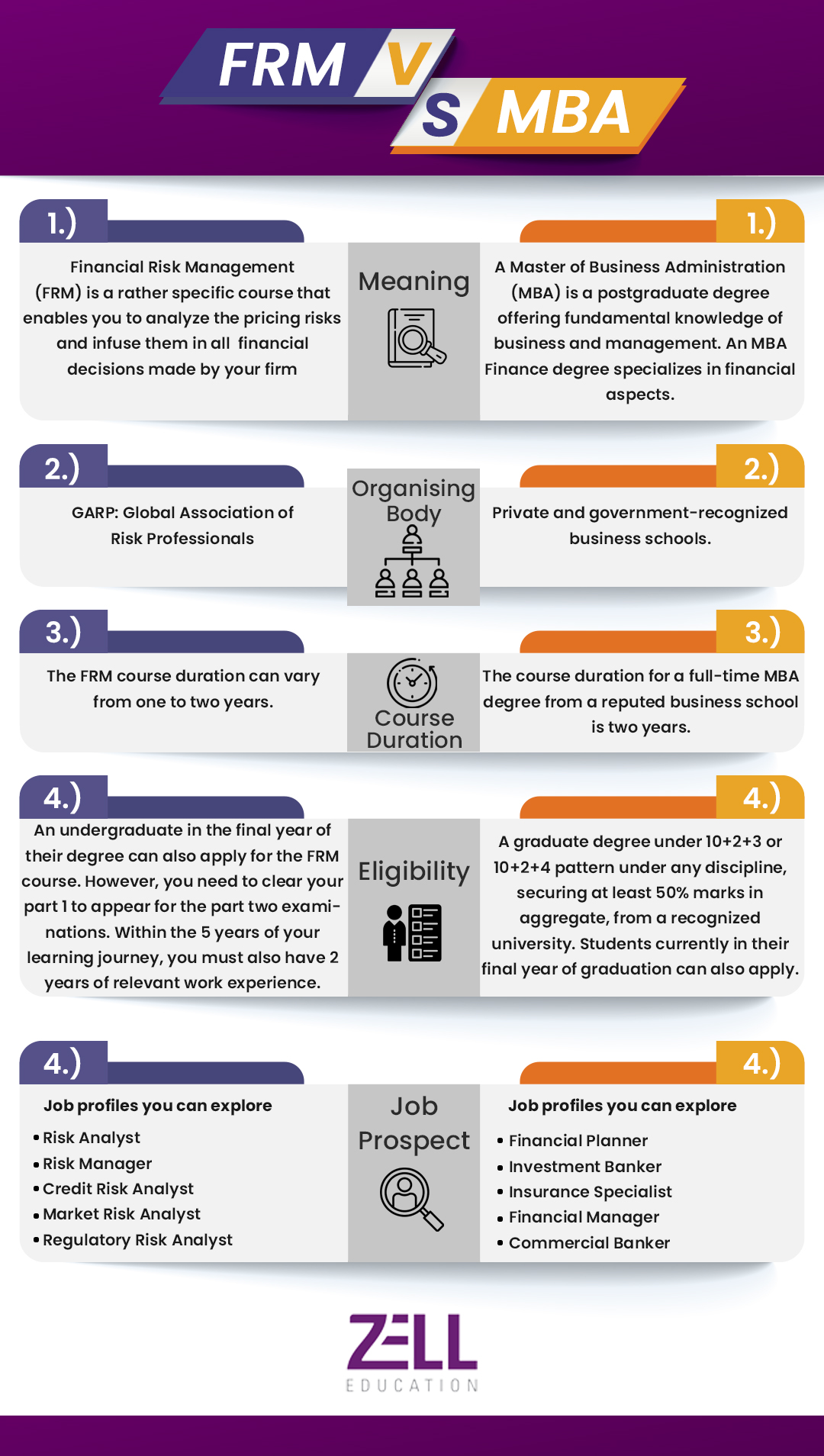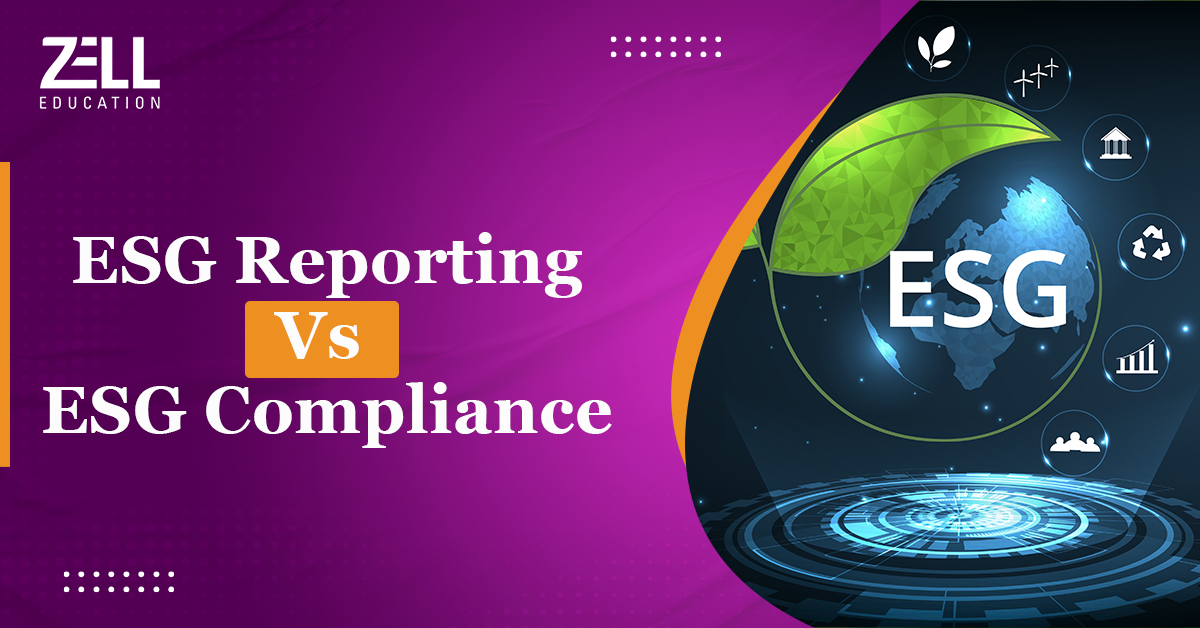FRM vs MBA: Which Should You Choose?
There is a massive influx of people looking to pursue a career in finance, as research shows that the Global Autonomous Finance Market will exhibit a CAGR of 16.5% by 2028. MBA and FRM are highly sought-after courses among students who wish to get a full-time job in the financial sector.However, aspirants are often torn between choosing an FRM or an MBA in Finance. While an MBA acquaints candidates with the broader aspects of managing the financial aspects of a business, FRM imparts in-depth knowledge of financial risks.
So, which one to choose?
If you, too, are confused with the FRM vs MBA debate, read on to learn the differences between the two so that you can make an informed decision.
Who should pursue MBA in Finance?
An MBA (Master of Business Administration) is a post-graduate degree for candidates who want to kickstart a career in business management. Among the many specialisations offered, you can go for an MBA in Finance if you wish to apply your managerial skills to the finance sector.
You can opt for MBA in Finance, keeping the following pointers in mind:
- An MBA specialising in finance is suitable for people with a vision for a successful career in finance. The programme imparts knowledge of the management of finances and accounts for companies.
- If you are already an experienced working professional in the finance sector, you can go for higher education like an MBA to hone your skills.
- People with an entrepreneurial spirit who wish to start their own company specialising in fintech can benefit significantly from an MBA in Finance.
Who should pursue FRM?
The Financial Risk Management or FRM certification is the top qualification standard globally for Risk Managers.
Here’s what you must remember if you want to pursue FRM:
- The FRM certification is apt for people who want to strengthen their knowledge of financial markets, risks, and risk management tools without pursuing a traditional degree in risk management.
- An FRM certification will boost your resume if you want to serve in financial management positions focusing on risk management and analysis.
- If you wish to expand your global network, then an FRM certification is suitable for you as you will get to interact with industry experts while pursuing the course.
FRM vs MBA: Major differences
| Point of Difference | FRM | MBA |
| Organising body | GARP (Global Association of Risk Professionals) awards the FRM designation to individuals who wish to land the role of a Risk Manager. | Private and public universities and colleges worldwide offer MBA courses to interested candidates. |
| Fees comparison | It is more affordable than an MBA course.
The standard enrollment fee for FRM is USD 400, while the exam fee is USD 800. The books from GARP will cost you more. |
Depending on the college, it will cost you between INR 4 to 20 LPA to complete your MBA degree.
MBA fees are much higher than FRM since autonomous authorities provide the course. |
| Course duration | You must clear the Level 2 exam within a maximum of 4 years after clearing Level 1. | An MBA program from a reputed university will take two years to complete. |
| Syllabus | The syllabus mainly includes
Risk Models. Quantitative Analysis. Operational Risk, Market Risk and Credit Risk. Valuation. Liquidity and Treasury Risk Management. Financial Market. |
The syllabus includes
Business Ethics. Financial and Marketing Management. Operations Research. Accounting. Business Statistics. Human Resource Management. |
| Job prospect | Common job profiles after an FRM include:
|
An MBA in Finance will land you one of the following job profiles:
|
| Salary expectations | The mean salary for a Risk Manager in India ranges between INR 3.61 LPA and INR 20 LPA. | The average base salary for a graduate in MBA Finance in India is INR 7.62 LPA. It can go up to INR 20 LPA for an Operations Manager. |
Which is better: MBA in Finance or FRM?
FRM and MBA in Finance are relevant courses for candidates seeking a fulfilling career in finance. But weigh both options well before you make a choice.
- Regardless of your job role or the industry you’re working in, the salary you take home is crucial in determining whether you will go for an MBA or FRM. That brings us to the FRM vs MBA salary question. While the base salary for a financial risk professional is around INR 3.61 LPA, an MBA graduate can expect a salary package of INR 7.62 LPA.
- Pursuing an FRM certification is relatively less expensive than an MBA degree.
- If you want, you can finish the FRM exams within one year. On the contrary, an MBA takes two years in most business schools worldwide.
Conclusion
The conclusion one draws from the FRM vs MBA in finance debate is subjective. However, you must know the key distinctions between the two finance courses. While both are globally recognised, an FRM course is less expensive and more focused on particular topics than an MBA. However, an MBA equips you with managerial skills that come in handy in the workplace.
Apart from MBA and FRM, a CFA (Chartered Financial Analyst) Course is one of the top certificate courses in the finance industry. A combination of the three will push you towards a lucrative career in finance. The CFA course at Zell Education is a globally-recognised certification you can pursue after your FRM or MBA.
FAQ
Is FRM better than MBA?
FRM and MBA have relevance in the industry. Getting either (or both) of them can benefit your career in the finance market.
Is FRM equivalent to a Master’s degree?
Reports suggest that the FRM is equivalent to a Master’s degree in finance. It is better than a Master’s, focusing on a single risk management point
Can we do FRM after MBA?
You can get the FRM certification after your MBA degree to enhance your knowledge and improve your job prospects.
What is better than FRM?
There are many courses for students in finance and accounting besides FRM, such as the CFA. Any of these can be beneficial for your career.
Is it advisable to do an FRM course after an MBA degree?
You can finish your MBA degree and then enrol for an FRM course. The combined knowledge will only help you excel in your career in the finance sector.
Is MBA an easier course compared to FRM?
It is not feasible to compare the two as each has its advantages. While you can complete the FRM earlier than an MBA, the course is quite challenging for people with no experience in risk management. An MBA, however, may be smoother even if you have no prior business management experience.










